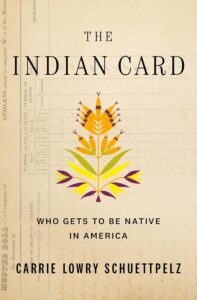NOTE: THIS WEBSITE IS A WORK IN PROGRESS. RESOURCES AND DATA ARE ADDED DAILY.
IMPORTANT: We are in urgent need of funding to keep this project alive and ensure its future. If you’re enjoying the site and see our vision for the project, please consider joining as a paid member or contributing to our crowdfunding campaign today. It is only with your help that we can continue this work.
Thanks so much for your support! – Jes
![]()
0
The Indian Card: Who Gets to be Native in America
Resource ID: 17848
Type: non-fiction, book
share:
Some buttons on this page link to external websites. If you visit one of our affiliate sites and make a purchase, I may receive a small commission at no extra cost to you. More info
- UPDATED: 6.17.2025
- Genetics, Inherited Trauma, American History, Migration, Indigenous History, History, Populations, Race+Ethnicity, Identity, Indigenous Issues, Culture
editor:
n/a
publisher:
date:
10.15.2024
ISBN:
9781250903167
pages:
304
notes:
. . .
contents:
description:
To be Native American is to live in a world of contradictions. At the same time that the number of people in the US who claim Native identity has exploded--increasing 85 percent in just ten years--the number of people formally enrolled in Tribes has not. While the federal government recognizes Tribal sovereignty, being a member of a Tribe requires navigating blood quantum laws and rolls that the federal government created with the intention of wiping out Native people altogether. Over two million Native people are tribally enrolled, yet there are Native people who will never be. Native people who, for a variety of reasons ranging from displacement to disconnection, cannot be card-carrying members of their Tribe.
In The Indian Card, Carrie Lowry Schuettpelz grapples with these contradictions. Through in-depth interviews, she shares the stories of people caught in the mire of identity-formation, trying to define themselves outside of bureaucratic processes. With archival research, she pieces together the history of blood quantum and tribal rolls and federal government intrusion on Native identity-making. Reckoning with her own identity--the story of her enrollment and the enrollment of her children--she investigates the cultural, racial, and political dynamics of today's Tribal identity policing. With this intimate perspective of the ongoing fight for Native sovereignty, The Indian Card sheds light on what it looks like to find a deeper sense of belonging.
In The Indian Card, Carrie Lowry Schuettpelz grapples with these contradictions. Through in-depth interviews, she shares the stories of people caught in the mire of identity-formation, trying to define themselves outside of bureaucratic processes. With archival research, she pieces together the history of blood quantum and tribal rolls and federal government intrusion on Native identity-making. Reckoning with her own identity--the story of her enrollment and the enrollment of her children--she investigates the cultural, racial, and political dynamics of today's Tribal identity policing. With this intimate perspective of the ongoing fight for Native sovereignty, The Indian Card sheds light on what it looks like to find a deeper sense of belonging.
peoples:
CMOS:
author-date:

